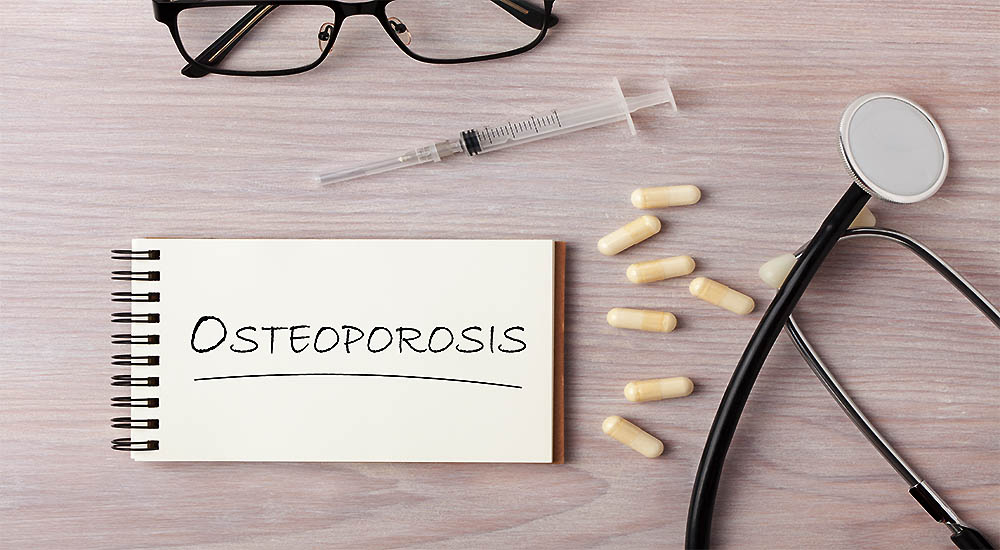Is Gluten Intolerance Causing Your Osteoporosis?

Osteoporosis Can Be Fatal
Osteoporosis affects 20 million people and is responsible for over 1 million fractures a year. Sadly 50% of survivors of a hip fracture never leave the nursing home and in up to 20% of the elderly such fractures can be fatal.
Women turn to milk, cheese, and calcium supplements hoping to stave off this terrible disease. It turns out that the correlation between dairy products and strong bones is more marketing than truth, and very few doctors screen for gluten intolerance in their osteoporotic patients or those with a family history of it, despite overwhelming research that supports this association.
Dairy Consuming Cultures Have Higher Rates of Osteoporosis
When evaluating the bone density of different cultures it is fascinating to note the countries that consume the highest amount of dairy products (the US and Europe) have the worst bone density and the highest incidence of osteoporosis. Cultures that consume little to no dairy products and animal products, in general, have the lowest incidence of osteoporosis.
Here at Root Cause Medical, our clinical nutrition department frequently has patients remove dairy products from their diet as we find it is a common irritant and stressor to the body. While patients often ‘complain’ that they feel better dairy-free (they were hoping not to notice any positive difference), they frequently follow up with a question regarding calcium needs.
Does Milk ‘Do a Body Good’?
The above was a great advertising slogan and I think most of us remember the cute milk moustache sported by celebrities and politicians alike. But is it true? It turns out that the answer is no.
Milk has calcium but it’s not easily absorbed and the acidic environment created by it tends to pull calcium out of the bones more so than it strengthens them. Most of the world’s population is lactose intolerant and in fact, we don’t naturally produce the enzymes to digest milk products from any animal but our own mother, and the latter only lasts until we are about 2 to 3 years old.
In analyzing bone loss doctors tended to focus on only one mineral, calcium while neglecting the importance of maintaining a balance of all the minerals in the bony matrix. Bone consists of many minerals including magnesium, zinc, and boron – osteoporosis is not simply a disease of calcium deficiency.
With that said, calcium is still important to consume and the best form of dietary calcium is found in dark green leafy vegetables. Increasing your dietary consumption of fruits and veggies to 7+ servings per day (men need at least 9) is highly recommended. The benefits are many but the main one, above the health-enhancing antioxidants, is that fruits and vegetables will alkalize the blood due to their high levels of magnesium and potassium. This is very important for bone health because acidic blood, which tends to result from eating a lot of animal products, is typically offset or buffered with calcium.
Simply explained, calcium, an alkaline mineral, is pulled from the bone to lessen the acidity of the blood. While this works beautifully to make the blood less acidic, the side effect is weaker bones.
What Should You Do? 7 Things to Decrease Your Risk
1. Gluten intolerance – get screened for gluten intolerance. Celiac disease, one form of gluten intolerance, is an autoimmune disease like osteoporosis. The presence of one autoimmune disease increases the incidence of others so a celiac disease or osteoporosis family history is a very good reason to be screened. Those with gluten intolerance have an increased risk for this disease.
Having worked with patients for two decades, we have found that bone density often improves on a gluten-free diet. Osteoporosis is a debilitating disease. If a dietary change makes an improvement, it should be utilized in all who are affected.
2. Exercise – weight-bearing exercise is critical to building strong bones. This would exclude swimming (not weight bearing) but it doesn’t mean that you have to ‘pound the pavement’ running either. A brisk walk outside or on the treadmill is just fine in addition to lifting light weights. Hand weights while walking enhances weight bearing even more.
Additionally, resistance exercises are not only highly effective but can be safely done by an elderly population.
3. Vitamin D – have your vitamin D levels checked and ensure they are above 50. If you are deficient take a high-quality vitamin D3 in an oil-based medium. Approximately 2,000 IUs are required per day for every 10 points you wish to raise your level. Retest in 3 months to evaluate that what you are doing is working.
E.g. if your level is 30, then you’d want to take 4,000 IU/day.
4. Calcium supplements – utilize care when taking a supplement. Calcium citrate is the most absorbable form of calcium in a tablet form but doesn’t exceed 1,000 mg per day. Also, taking a mineral supplement that contains other ingredients such as magnesium, boron, and vitamin K will have a greater impact on bone building. Boron reduces bone loss and vitamin K enhances bone-building – both are found in those wonderful fruits and vegetables we have discussed.

5. Estrogen – women over the age of 40 should have their estrogen levels checked. If you are fine at age 40, get checked again at 45 and 50, a lot can change in that particular time period. Good estrogen levels can help to maintain and build bones, in addition to performing other important functions. Here at Root Cause Medical, our clinical nutrition department specializes in normalizing hormonal balance naturally.
6. Fatty acids – recent studies have found that omega-3 fatty acids found in fish oil and edible plants are helpful in strengthening bones. The addition of a good quality fish oil plus the above-mentioned servings of fruits and vegetables are an excellent protocol to adopt.
There is a fatty acid lab test that is excellent for determining what your status of these important nutrients is.
7. Fluoride – ensure that you are consuming as little fluoride as possible. Fluoride poisons the bone-building cells that are responsible for building and repairing bone, thus leading to osteoporosis. Check your toothpaste, water, and dental floss to start.
My own mother, age 88, was diagnosed with severe osteoporosis almost 30 years ago. Once we diagnosed her gluten intolerance and removed dairy products from her diet, her bone density improved measurably on our clinical nutrition program! I hope you find this helpful.
It is likely that you know someone suffering from this debilitating disease. They and their family members could likely gain benefit from this information.
Osteoporosis is quite preventable and treatable if addressed in a timely fashion. Please let me know if you have any further questions. We are here to help you, your family, and your friends.
Do you need help with your health?
We have the diagnostic and testing tools, the clinical experience, and a different medical approach to discovering the root cause of why you have the symptoms that are bothering you. As long as you are ready to make some dietary and lifestyle changes, we can help you. We will "hold your hand" through the changes, step by step, to make each step an easy one. We are located in Clearwater, FL, at 1000 S Ft Harrison, at the corner of Ft. Harrison Ave. and Magnolia St. There is plenty of parking space directly accessible from Ft Harrison. If it is not convenient for you to come to Root Cause Medical Clinic, we offer telehealth/telemedicine consultations to residents of certain states. Call us for details.
Contact us for a Consultation – Call 727-335-0400

Dr. Vikki Petersen DC. CCN
Founder of Root Cause Medical Clinic
Certified Functional Medicine Practitioner
Dr Vikki Petersen is a public speaker, author of two books, several eBooks and creates cutting edge content for her YouTube community. Dr Vikki is committed to bringing Root Cause Medicine and its unique approach to restoring health naturally to the world.
Ask a Doctor
Have a health concern you'd like to speak with a doctor about? Or just want clarity on a subject? Ask Us!


